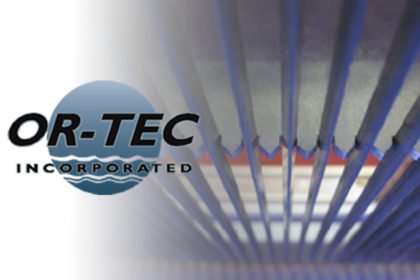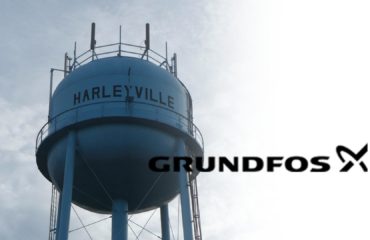
The city of Louisville, Ohio installed a 3 mm Or-Tec Blue Whale Microbar Screen in its wastewater treatment plant in November 2018 to screen hair, wipes, plastics and other ’rags’ from its influent wastestream. Louisville is a bedroom community with around 10,000 residents and a few light businesses. Its plant is designed to treat up to 6 million gallons of wastewater per day.
The 3 mm Or-Tec Blue Whale Microbar Screen replaced a 10-year old perforated band screen that was failing and had, in fact, been problematic from the start. “I was never happy with it (band screen) from when it was new,” explains Chief Operator Rich Goebeler, “We always felt like it was only capturing maybe 50% or 60%.” To compensate, operators used a hand rake located downstream of the band screen after aeration and before final clarifiers to remove four to eight 5-gallon buckets of material each day.
The band screen also needed a lot of repairs. Both the brush and pillow blocks on its bearings needed to be replaced after a few years. Then, after just six years, the stainless-steel keepers holding the rubber channel seals oxidized off.
“They were gone,” recalls Goebeler, “leaving debris to bypass the actual screen around the sides.” The band screen company offered a pricey “update” kit to fix them. This upset him. He recalls telling them, “But the other ones rotted off! Can’t you give us a price break? I mean, they were bad after six years!”
Hundreds of the band screen’s chain plates were also bent, allowing even more material to bypass the band screen. Hand raking became a constant chore. “The guys would go out three or four times a day and clean off the (hand rake) screen,” explains Service Director Dan Milsap. “They would rake buckets, and buckets and buckets of hair and other material that was going through the (band) screen.”
In short, Goebeler says, after just ten years, the band screen needed a complete overhaul. With repairs approaching $20,000, the city decided to abandon it.
After research, recommendations from another Ohio wastewater plant and bidding, Louisville chose the 3mm Or-Tec Blue Whale Micro Bar Screen. “I was impressed with the 3mm opening that they (Or-Tec) had and what it was pulling out of the system,” Milsap says.
The city has not been disappointed. “The Blue Whale has been great,” Milsap says. “I believe we have been very fortunate. It has kept up with our peak flows at the plant. It’s probably been one of the best products that we purchased over the years.”
The new Or-Tec 3mm Blue Whale Microbar Screen is removing enough debris to fill a 2 cubic yard dumpster each week. This is in sharp contrast to the band screen, which was filling just one third of the dumpster weekly.
As expected, hand raking has decreased sharply. Goebeler says that operators are hand raking just a ½ gallon bucket of debris a day, and he expects it to continue to decline. “Our system is still cleaning out,” he explains, “I think we will keep getting less and less debris out.”
Goebeler is impressed with the ease of mainte-nance of the 3mm Or-Tec Blue Whale Microbar Screen. “It’s something that we don’t have to give constant attention to,” he notes. “It’s just down there running, doing its job.”
He says that the only maintenance has been routine. Operators grease the main shaft bear-ings every two weeks. Downstream maintenance has also decreased., including less cleaning and fewer replacement parts. “It’s saving on man hours. It’s saving on time. We couldn’t be happier with it,” Milsap says.
Water savings are also enormous. The 3mm Or-Tec Blue Whale Micro Bar does not require wash water. Goebeler says that the old band screen used 60 gallons of wash water per minute.
On average, this meant that it used about 26,000 gallons of wash water per day, but he says even that is a ‘very conservative” estimate. He says that because the former screen ran based on the level in the channel, rainy or wet periods would cause it to operate continuously – using approximately 16,440 gallons per hour, or 394,560 gallons per day.
“First, we have the water savings, then the reduced maintenance, “ Goebeler says. “I just feel that it is a very good piece of equipment and I would highly recommend it to anyone else.” Milsap agrees.
Goebeler and Milsap say that working with Or-Tec was terrific. Milsap was especially impressed with the help the company provided during installation.
Milsap said Or-Tec was right there on site helping. “You always wonder how the transition is going to go when you are replacing a piece of equipment of that size and importance, but it was seamless,” he says.
“(Or-Tec) helped us out a ton with the installation. They were there answering questions. They pretty much led the installation portion of the project and we’re grateful for that. It really, really helped us out.”
“The whole (Or-Tec) crew was great to deal with,” Milsap emphasizes.
The OR-TEC Blue Whale Micro Bar is completely unique screen because it can screen to openings as small as 1mm while not blinding due to its tapered bar construction and pene-trating rake teeth. This US patented screen is manufactured in an ISO 9001 and ISO 14001 factory and eliminates downstream matting without the use of wash water or brushes. This very high removal rate vastly improves the rest of the wastewater treatment plants operation by reducing fouling of pumps, valves and other rotating equipment.





Please let me know if you’re looking for a author for your site. You have some really great posts and I think I would be a good asset. If you ever want to take some of the load off, I’d absolutely love to write some articles for your blog in exchange for a link back to mine. Please blast me an e-mail if interested. Thank you!
Hello would you mind stating which blog platform you’re working with? I’m planning to start my own blog in the near future but I’m having a tough time choosing between BlogEngine/Wordpress/B2evolution and Drupal. The reason I ask is because your design and style seems different then most blogs and I’m looking for something completely unique. P.S My apologies for getting off-topic but I had to ask!
Undeniably believe that which you stated. Your favorite justification appeared to be on the internet the simplest thing to be aware of. I say to you, I definitely get irked while people consider worries that they plainly do not know about. You managed to hit the nail upon the top and also defined out the whole thing without having side effect , people can take a signal. Will likely be back to get more. Thanks
I like the valuable information you supply on your articles. I will bookmark your weblog and test again here frequently. I am fairly certain I will be informed a lot of new stuff right here! Good luck for the following!
Excellent write-up. I certainly love this website. Keep it up!
I am sure this article has touched all the internet users, its really really nice post on building up new website.
Hey there! Do you know if they make any plugins to protect against hackers? I’m kinda paranoid about losing everything I’ve worked hard on. Any recommendations?
Have you ever thought about publishing an e-book or guest authoring on other sites? I have a blog based upon on the same subjects you discuss and would really like to have you share some stories/information. I know my visitors would value your work. If you are even remotely interested, feel free to send me an e mail.
Wonderful goods from you, man. I’ve understand your stuff previous to and you’re just too magnificent. I really like what you’ve acquired here, really like what you’re stating and the way in which you say it. You make it entertaining and you still take care of to keep it sensible. I cant wait to read far more from you. This is actually a great site.
This is a topic that’s close to my heart… Take care! Where are your contact details though?
After exploring a few of the blog articles on your site, I truly like your way of blogging. I bookmarked it to my bookmark website list and will be checking back soon. Take a look at my web site as well and let me know what you think.
Good way of describing, and nice article to take information concerning my presentation topic, which i am going to convey in institution of higher education.
Your means of describing everything in this piece of writing is really good, all be able to effortlessly know it, Thanks a lot.
Post writing is also a fun, if you know then you can write otherwise it is complex to write.
I am extremely impressed with your writing skills and also with the layout on your blog. Is this a paid theme or did you customize it yourself? Either way keep up the nice quality writing, it’s rare to see a nice blog like this one nowadays.
Hey! I just wanted to ask if you ever have any problems with hackers? My last blog (wordpress) was hacked and I ended up losing months of hard work due to no data backup. Do you have any solutions to protect against hackers?
Hola! I’ve been following your site for a long time now and finally got the bravery to go ahead and give you a shout out from Lubbock Tx! Just wanted to mention keep up the excellent job!
Why users still use to read news papers when in this technological world everything is existing on net?
naturally like your website however you need to test the spelling on quite a few of your posts. Several of them are rife with spelling problems and I find it very bothersome to tell the truth then again I will surely come back again.
Wonderful site you have here but I was curious if you knew of any community forums that cover the same topics talked about in this article? I’d really love to be a part of group where I can get feed-back from other knowledgeable individuals that share the same interest. If you have any recommendations, please let me know. Thanks a lot!
Simply want to say your article is as surprising. The clearness in your post is simply excellent and i can assume you are an expert on this subject. Well with your permission allow me to grab your RSS feed to keep up to date with forthcoming post. Thanks a million and please continue the gratifying work.
Вип частный эротический массаж Москва в боди салоне
It’s truly very difficult in this busy life to listen news on TV, thus I only use internet for that purpose, and take the most up-to-date news.
I like the valuable information you supply on your articles. I will bookmark your weblog and check again here frequently. I am fairly certain I will be informed many new stuff right here! Good luck for the following!
Hi there, I found your site via Google while looking for a related topic, your website came up, it looks good. I’ve bookmarked it in my google bookmarks.
I love what you guys are usually up too. This sort of clever work and exposure! Keep up the fantastic works guys I’ve incorporated you guys to our blogroll.
I’m not sure why but this website is loading incredibly slow for me. Is anyone else having this issue or is it a problem on my end? I’ll check back later and see if the problem still exists.
Greetings! I know this is kinda off topic but I was wondering which blog platform are you using for this site? I’m getting tired of WordPress because I’ve had issues with hackers and I’m looking at options for another platform. I would be awesome if you could point me in the direction of a good platform.
We stumbled over here different page and thought I might check things out. I like what I see so now i am following you. Look forward to going over your web page again.
My spouse and I stumbled over here from a different page and thought I might check things out. I like what I see so now i’m following you. Look forward to looking over your web page again.
I’m impressed, I must say. Rarely do I encounter a blog that’s both educative and engaging, and let me tell you, you have hit the nail on the head. The issue is something which not enough people are speaking intelligently about. I’m very happy that I found this in my search for something concerning this.
It’s very easy to find out any topic on net as compared to books, as I found this post at this web site.
Howdy, i read your blog occasionally and i own a similar one and i was just wondering if you get a lot of spam comments? If so how do you prevent it, any plugin or anything you can advise? I get so much lately it’s driving me insane so any help is very much appreciated.
Link exchange is nothing else except it is simply placing the other person’s webpage link on your page at proper place and other person will also do same for you.
Today, I went to the beachfront with my kids. I found a sea shell and gave it to my 4 year old daughter and said “You can hear the ocean if you put this to your ear.” She put the shell to her ear and screamed. There was a hermit crab inside and it pinched her ear. She never wants to go back! LoL I know this is entirely off topic but I had to tell someone!
I was recommended this blog by my cousin. I am not sure whether this post is written by him as no one else know such detailed about my problem. You are wonderful! Thanks!
I always used to read article in news papers but now as I am a user of internet so from now I am using net for articles, thanks to web.
Keep on working, great job!
As the admin of this web site is working, no doubt very rapidly it will be well-known, due to its quality contents.
Greate pieces. Keep writing such kind of information on your blog. Im really impressed by your blog.
Hello there I am so glad I found your weblog, I really found you by mistake, while I was researching on Bing for something else, Regardless I am here now and would just like to say many thanks for a fantastic post and a all round exciting blog (I also love the theme/design), I don’t have time to browse it all at the minute but I have book-marked it and also added in your RSS feeds, so when I have time I will be back to read a great deal more, Please do keep up the excellent job.
Remarkable! Its actually awesome piece of writing, I have got much clear idea concerning from this article.
I loved as much as you will receive carried out right here. The sketch is tasteful, your authored subject matter stylish. nonetheless, you command get bought an impatience over that you wish be delivering the following. unwell unquestionably come further formerly again since exactly the same nearly a lot often inside case you shield this increase.
Good day! I know this is kinda off topic however , I’d figured I’d ask. Would you be interested in exchanging links or maybe guest writing a blog article or vice-versa? My website goes over a lot of the same subjects as yours and I believe we could greatly benefit from each other. If you happen to be interested feel free to send me an e-mail. I look forward to hearing from you! Awesome blog by the way!
I know this if off topic but I’m looking into starting my own blog and was wondering what all is required to get set up? I’m assuming having a blog like yours would cost a pretty penny? I’m not very internet savvy so I’m not 100% positive. Any tips or advice would be greatly appreciated. Thanks
Wow, superb blog layout! How long have you been blogging for? you make blogging look easy. The overall look of your site is wonderful, let alone the content!
Hi, just wanted to mention, I liked this post. It was funny. Keep on posting!
Hey I know this is off topic but I was wondering if you knew of any widgets I could add to my blog that automatically tweet my newest twitter updates. I’ve been looking for a plug-in like this for quite some time and was hoping maybe you would have some experience with something like this. Please let me know if you run into anything. I truly enjoy reading your blog and I look forward to your new updates.
I have read so many articles or reviews concerning the blogger lovers except this piece of writing is really a good post, keep it up.
I like the valuable information you provide in your articles. I will bookmark your weblog and check again here frequently. I am quite certain I will learn lots of new stuff right here! Good luck for the next!
I was wondering if you ever considered changing the page layout of your blog? Its very well written; I love what youve got to say. But maybe you could a little more in the way of content so people could connect with it better. Youve got an awful lot of text for only having one or two images. Maybe you could space it out better?
Generally I do not read article on blogs, but I wish to say that this write-up very forced me to try and do it! Your writing style has been amazed me. Thanks, very nice article.
This really answered my drawback, thanks!
I’m very happy to read this. This is the type of manual that needs to be given and not the random misinformation that is at the other blogs. Appreciate your sharing this best doc.
I have discovered some important matters through your website post. One other thing I would like to express is that there are several games on the market designed specifically for preschool age children. They involve pattern acknowledgement, colors, creatures, and shapes. These often focus on familiarization instead of memorization. This makes little kids occupied without feeling like they are studying. Thanks
You really make it seem so easy with your presentation but I find this matter to be really something which I think I would never understand. It seems too complicated and extremely broad for me. I’m looking forward for your next post, I?ll try to get the hang of it!
One thing I have actually noticed is the fact that there are plenty of beliefs regarding the lenders intentions when talking about foreclosed. One fairy tale in particular is the bank needs to have your house. The financial institution wants your hard earned cash, not the house. They want the amount of money they gave you along with interest. Avoiding the bank will undoubtedly draw a new foreclosed realization. Thanks for your posting.
Thanks for the concepts you have discussed here. Also, I believe there are several factors that will keep your car insurance premium decrease. One is, to contemplate buying autos that are within the good set of car insurance corporations. Cars which have been expensive are definitely more at risk of being stolen. Aside from that insurance is also in line with the value of your car, so the more pricey it is, then higher your premium you pay.
I have realized some points through your blog post. One other point I would like to talk about is that there are numerous games available on the market designed especially for preschool age kids. They incorporate pattern acceptance, colors, wildlife, and patterns. These often focus on familiarization rather than memorization. This helps to keep children and kids occupied without sensing like they are learning. Thanks
Thanks for thr great article!
It is very comforting to see that others are suffering from the same problem as you, wow!
Howdy! This is my first comment here so I just wanted to give a quick shout out and tell you I really enjoy reading your blog posts. Can you recommend any other blogs/websites/forums that go over the same subjects? Appreciate it!
Thanks for expressing your ideas right here. The other thing is that if a problem appears with a personal computer motherboard, persons should not take the risk associated with repairing this themselves because if it is not done properly it can lead to irreparable damage to the full laptop. It is almost always safe to approach any dealer of the laptop with the repair of motherboard. They have technicians that have an skills in dealing with mobile computer motherboard challenges and can get the right analysis and undertake repairs.
Thanks for every other informative website. The place else may just I get that kind of info written in such an ideal means? I have a venture that I’m just now operating on, and I have been on the look out for such info.
I used to be able to find good advice from your articles.